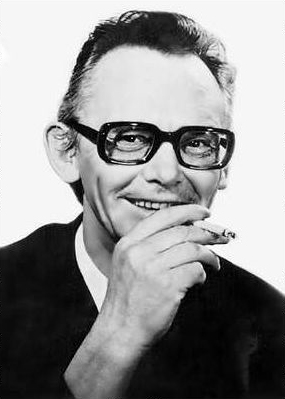- Leonid Gaidai
Infobox Actor
name = Leonid Gaidai

caption = Leonid Gaidai
birthname = Leonid Iovich Gaidai
birthdate = birth date|1923|01|30
location =Svobodny, Amur Oblast ,USSR
deathdate = death date and age|1993|11|19|1923|01|30
deathplace =Moscow ,Russia
spouse = Nina Grebeshkova (b. 1930)Leonid Iovich Gaidai ( _ru. Леони́д И́ович Гайда́й) (
January 30 1923 in Slobodny (Oblast Amur); †November 19 1993 ,Moscow ) was one of the most popular Soviet comedy directors, enjoying immense popularity and broad public recognition in the formerUSSR & modernRussia . His movies broke theatre attendance records and are still some of the top-sellingDVD s in Russia.Early life and first success
Gaidai was born on
January 30 ,1923 inSvobodny, Amur Oblast , where he is commemorated by a statue. After serving in theRed Army during theSecond World War , Leonid Gaidai attended the Moscow Institute of Cinematography. He married the actress, Nina Grebeshkova, who played minor roles in his future films. His first success came 6 years after graduation, with a segment of the short film collection "Sovershenno seryozno" (1961), which instantly became highly popular. In this movie Gaidai first introduces a comic trio of crooks -Yury Nikulin ,Georgy Vitsin , andEvgeny Morgunov who later appear in several of his other films. After his characters and directing style won the public's love, his name gained massive selling power in USSR's movie theatres.Genre brilliance
Between 1961 and 1975, Gaidai directed a number of top-selling movies, each one a huge financial success and becoming wildly popular in the Soviet Union. During these years, he filmed new adventures of the mischievous trio in "The Bootleggers" ("Samogonshchiki", 1961), "
Operation Y and Other Shurik's Adventures " ("Operatsiya Y i drugie priklyuchenie Shurika", 1965), and "The Prisoneress of the Caucasus, or Shurik's New Adventures " ("Kavkazskaya plennitsa, ili novye priklyuchenia Shurika", 1966). Following his break with Morgunov, Gaidai disbanded the trio, while casting Vitsin in a film adaptation ofO. Henry 's novellas ("Businessmen", 1962) and Nikulin in what was to become the most popular Soviet comedy ever made, "The Diamond Arm " (Brilliantovaya ruka, 1968).In the 1970s, Gaidai worked primarily with the comedians from his own studio group, which included Vitsin,
Leonid Kuravlev ,Mikhail Pugovkin ,Savely Kramarov ,Natalya Seleznyova ,Natalya Krachkovskaya , and his wife Nina Grebeshkova. All this cast was featured in his film adaptation ofMikhail Zoshchenko 's short stories, "Impossible!" ("Ne mozhet byt!", 1975). He also filmed a play byMikhail Bulgakov , "" (Ivan Vasilievich menyaet professiyu, 1973),Ilf and Petrov 's "The Twelve Chairs" (1971),Nikolai Gogol 's "The Government Inspector " (1970), and "Borrowing Matchsticks" (Za spichkami, 1980), a story by the Finnish authorMaiju Lassila .Business success
Gaidai's top-grossing movie "The Diamond Arm" (Brilliantovaya ruka) sold 76,700,000 tickets in the Soviet Union alone. At $8 per ticket (regular fare in an American movie theatre in 2005), it would have generated revenue comparable to the US box office champion "Titanic". At least five of Gaidai's movies had more than 50 million ticket sales.
Due to the state-controlled nature of USSR movie industry, all revenue from movie sales went back into the state coffers. However, Gaidai personally received a small percentage of ticket sales as a government incentive. This didn't last long, though, since it soon became apparent that even with the tiny royalty offered he would quickly become a legal Soviet multi-millionaire.
Later years
After 1975, Gaidai went into a period of significant decline; his only other notable work was a joint Soviet-Finnish film "Za spichkami" ( _en. Borrowing Matchsticks; Finnish: "Tulitikkuja lainaamassa"), completed in 1980. After the collapse of the Soviet Union, he directed only two more movies, capitalizing on the early
Perestroika business activities and starringDmitry Kharatyan . Gaidai has a cameo in the final one, "Na Deribasovskoy", where he plays an old gambler who tries to beat the one-armed bandit. In real life, Gaidai was addicted to gambling. These proved the most popular of his works filmed after 1975 but lacked the success of his earlier work. Gaidai was made aPeople's Artist of the USSR several months before the Union's demise and died inMoscow onFriday November 19 ,1993 .Assessment
Gaidai remains most famous for the outstanding string of comedies he directed between 1961 and 1975, when 9 of the 10 movies he made became Russian classics, selling between 20 and 76 million movie tickets each, and becoming box office champions for several years in a row. Gaidai was a master of fast-paced comedy, his style and rhythm somewhat similar to
Stanley Kramer 's "It's a Mad, Mad, Mad, Mad World ". He is virtually unknown outside of the former Soviet Union, due to the specific nature of his comedies, intrinsically tied to Soviet culture and lifestyle - unlike the motives of the characters of Kramer's "Mad World" being easily understood by the Russian public, living in the highly materialistic world of late Soviet Union. Gaidai's only international recognition was a nomination for best short film at the 1960Cannes Film Festival for "Medor, le chien qui rapporte bien".External links
*imdb name|id=0301145|name=Leonid Gaidai
* [http://www.russia-ic.com/culture_art/theatre/184/ Maestro of Russian Comedy: Leonid Gaidai]
Wikimedia Foundation. 2010.
